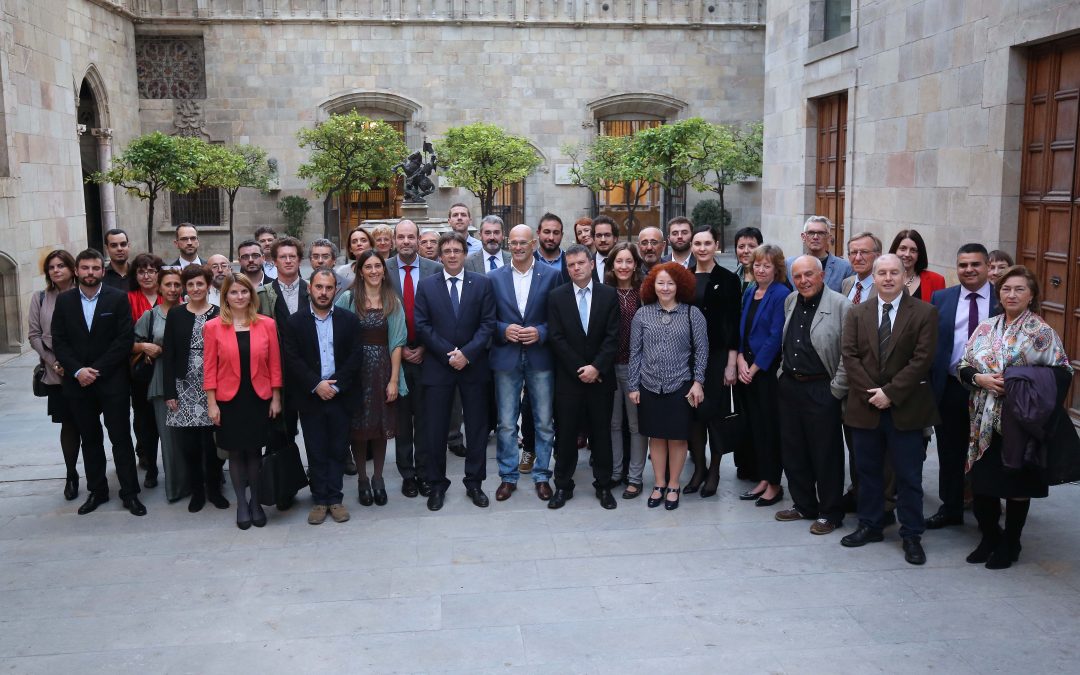Delegates to the ELEN Barcelona General Assembly discussed the new ELEN recommendations for protecting lesser-used languages with MEPs and the Council of Europe. The recommendations were drawn up following the June hearing in the European Parliament on language discrimination in the EU. The GA also strongly supported the new Donostia Protocol for language rights.
Speaking after the official launch, ELEN Secretary-General Davyth Hicks, outlined the new proposals to delegates and MEPs gathered from across Europe. The measures include a new European Framework Strategy for regional or minority languages similar to the Roma Framework Strategy, ring-fenced funding for endangered language projects, a European Language Commissioner to ensure language rights, and using existing mechanisms such as opening EU infringement proceedings over cases of anti-regional language discrimination.
In the longer term the organisation is working towards an EU Directive that would tackle language endangerment as well as language discrimination.
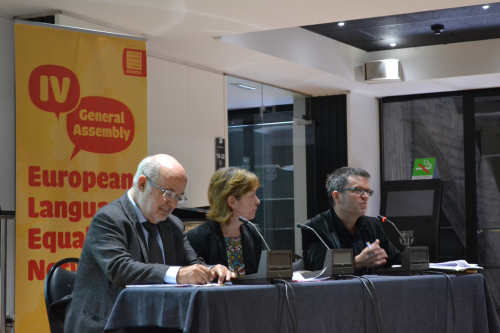
MEPs Jill Evans (Plaid Cymru) and Josep-Maria Terricabras (ERC) followed with a panel discussion on language issues and the ELEN Recommendations, and what can be done at the European level. Jill Evans outlined the work that she’s done both to protect Welsh and many smaller national and regional languages, including the campaign for Welsh official status in the Parliament. Both MEPs fully supported the proposed measures and suggested how they could be implemented at the European Parliament and EU Commission.
The Assembly adopted the Recommendations in full and they will now form the basis of ELEN’s advocacy work for the near future.
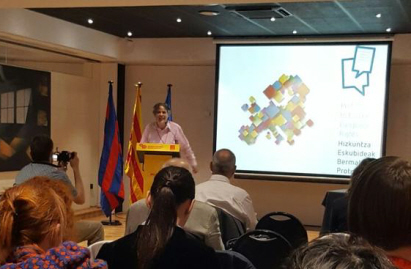
In addition, Vice-President Paul Bilbao (Kontseilua) updated delegates on the new Donostia Protocol which is set to be launched on December 17th with ELEN member organisations playing a key role in its promotion and implementation, and showing their strong support for the Protocol at the GA.
Rosa de les Neus Marco from Plataforma per la Llengua made a substantial presentation on the leading language organisation for Catalan, its history and campaigns, and on current challenges facing Catalan normalisation. Rosa now sits on the Steering Committee as Vice-President.
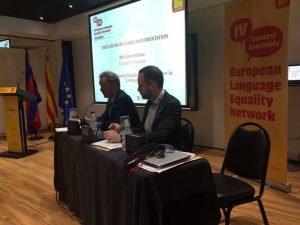
ELEN warmly welcomed the head of Secretariat for the Council of Europe’s Charter for Regional or Minority Languages, Sixto Molina. In his presentation, moderated by Daniel Mundet (Plataforma per la Llengua), he discussed current issues with Charter implementation. Delegates talked with him about working towards French and Italian ECRML ratification and how that may be achieved.
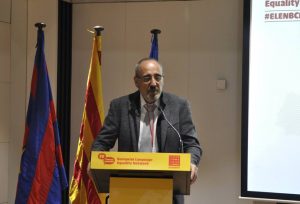
ELEN elections were the next item. Ferran Suay was nominated as the President which he accepted. The following were elected as ELEN’s Steering Committee for the next three years: Tangi Louarn (Kevre Breizh – ELEN France), Paul Bilbao-Sarria (Kontseilua), Ciarán Mac Giolla Bhéin (Conradh na Gaeilge), Marcos Maceira (A Mesa pola Normalización Lingüística), Rosa de les Neus Marco (Plataforma per la Llengua), Sioned Haf (Mudiad Dathlu’r Gymraeg/ Cymdeithas Yr Iaith Gymraeg), Claudia Soria (Consiglio Nazionale delle Ricerche), Anneli Sarhimaa (SNeB at the University of Mainz), Krisztina Sándor (Erdélyi Magyar Nemzeti Tanács), Alexis Quentin (Institut d’Estudis Occitan), Conchúr Ó Giollagáin (Soillse), Timur Seifellen (EstBLUL), and Nicolas Caracota (Council of Armans).
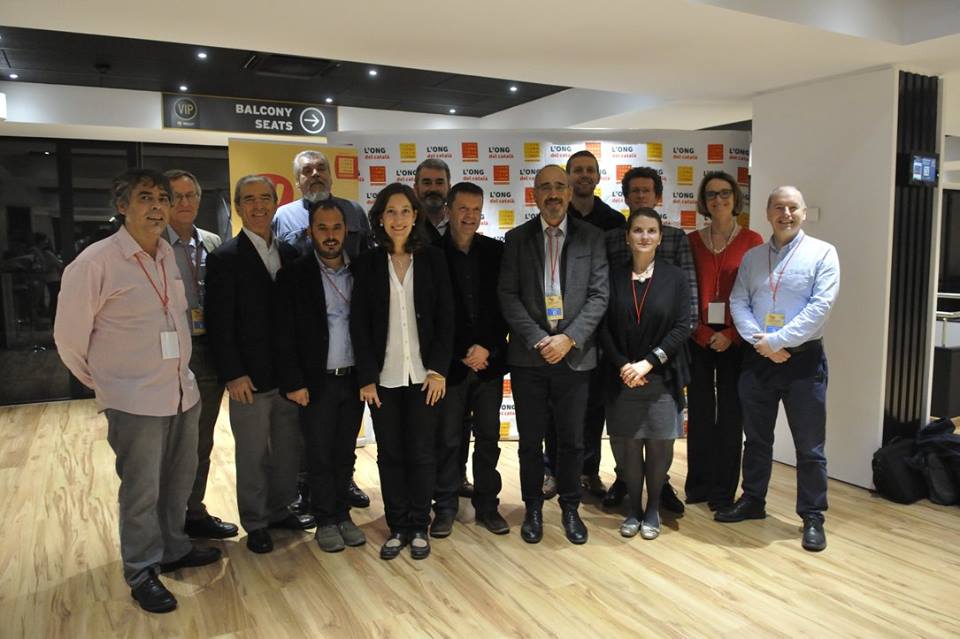
Vice-President Tangi Louarn (Kevre Breizh, ELEN France), Alexis Quentin (Institut d’Estudis Occitans) and Julie Windebank (Kevre Breizh) presented a paper on current issues for regional languages in the French state including the ongoing battle for the recognition of language rights, for French ratification of the ECRML, their work at the UN, and the ELEN France meeting in Guadeloupe.
Human rights lawyer and representative of the Szlovákiai Magyarok Kerekasztala (Round Table of Hungarians), János Fiala, discussed his experiences in bringing discrimination cases to international tribunals. ELEN members agreed, firstly, to develop training courses on language rights, and that the next step needed to challenge instances of anti-regional language discrimination will be to bring cases to the European Court of Human Rights.
Problems facing the Celtic languages with the impending threat of ‘Brexit’ were discussed next with a panel comprising Ceri Owen (Mudiad Dathlu’r Gymraeg), Ciarán Mac Giolla Bhéin (Conradh na Gaeilge), Dòmhnall MacNèill (Comunn na Gàidhlig), Conchúr Ó Giollagáin (Soillse), and Davyth Hicks on behalf of Kowethas An Yeth Kernewek. It was agreed that the organisations would work together to counter any threat to their languages and lobby the UK Government and the EU in order to ensure that there will be no cuts in UK of EU funding.
Delegates discussed language rights situations with several member organisations. Krisztina Sándor and Tibor Toro (EMNT and Transylvania Watch) on Hungarian in Romania; Marcos Maceira and Paulo Filguerias on Galician; Nicolas Caracota and Kira Mantsu on Arman; and Inaciu Galan on Asturian.
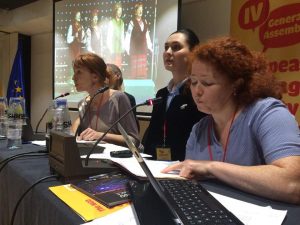
Presentations were also made by EstBLUL members on the linguistic situation of several east European languages: Kallu Eller on Võro, Erik Juzõkainon on Mari, Nadežda Ptšelovodova on Udmurt, Natalia Ermakov on Erzya, and Timur Seifullen on Tatar, with interpretation by Maris Kilk from EstBLUL.
Claudia Soria spoke to delegates about the Digital Language Diversity Project and its success in holding the first ever survey into the digital requirements of Breton, Basque, Karelian and Sardinian. The online survey, conducted in each of the four languages, gained a huge response. The DLDP Project, which now enters its second year of development, encourages all lesser-used language speakers to get involved. Next steps for the project, on which ELEN is a partner, is for a Language Survival Kit and a Roadmap for Digital Language Diversity.
The Assembly concluded with a warm vote of thanks to Plataforma per la Llengua for all of their work in organising the meeting and with two resolutions. One calling for EU ring-fenced funding for regional or minority languages, and a resolution expressing ELEN support for the Standing Rock Lakota in their campaign against having an oil pipeline built through their land.
The Assembly was opened by Catalan Parliament President Carme Forcadell, Barcelona FC Director Jordi Moix, and Plataforma per la Llengua President Oscar Escuder.
ELEN represents 44 languages with 150 member organisations in 22 European states, it works to represent the 55 million people who speak a regional, minoritised or endangered language.
The General Assembly was hosted by Plataforma per la Llengua, the Catalan NGO established to defend and promote Catalan all over the Catalan-speaking territories, and supported by the Catalan Government and FC Barcelona.

